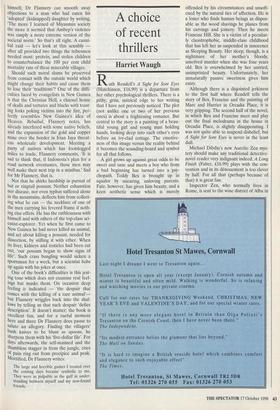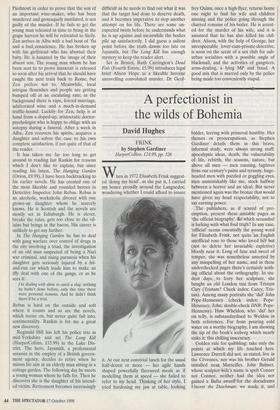A choice of recent thrillers
Harriet Waugh
Ruth Rendell's A Sight for Sore Eyes (Hutchinson, £16.99) is a departure from her other psychological thrillers. There is a pithy, grim, satirical edge to her writing that I have not previously noticed. The plot (not unlike one or two of her previous ones) is about a frightening romance. But central to the story is a painting of a beau- tiful young girl and young man holding hands, looking deep into each other's eyes before an ivy-clad cottage. The emotive- ness of this image versus the reality behind it becomes the sounding-board and symbol for all that follows.
A girl grows up against great odds to be sweet and sane and meets a boy who from a bad beginning has turned into a psy- chopath. Teddy Bex is brought up in squalor by uncaring, unloving parents. Fate, however, has given him beauty, and a keen aesthetic sense which is merely offended by his circumstances and unsoft- ened by the natural ties of affection. He is a loner who finds human beings as dispos- able as the wood shavings he planes from his carvings and joinery. Then he meets Francine Hill. She is a victim of a peculiar- ly claustrophobic, middle-class childhood that has left her as suspended in innocence as Sleeping Beauty. Her sleep, though, is a nightmare of her mother's bloody, unsolved murder when she was four years old. Bex is overwhelmed by her untried, unimprinted beauty. Unfortunately, her unnaturally passive sweetness gives him entry.
Although there is a disjointed jerkiness to the first half where Rendell tells the story of Bex, Francine and the painting of Marc and Harriet in Orcadia Place, it is very gripping. The second half of the novel, in which Bex and Francine meet and play out the final melodrama in the house in Orcadia Place, is slightly disappointing. I was not quite able to suspend disbelief, but A Sight for Sore Eyes is never in the least dull.
Michael Dibdin's new Aurelio Zen mys- tery should make any traditional detective- novel reader very indignant indeed. A Long Finish (Faber, £16.99) plays with the con- vention and in its denouement is too clever by half. For all that (perhaps because of that) it is great fun.
Inspector Zen, who normally lives in Rome, is sent to the wine district of Alba in Piedmont in order to prove that the son of an important wine-maker, who has been murdered and grotesquely mutilated, is not guilty of the murder. If he fails to get the young man released in time to bring in the grape harvest he will be relocated to Sicily. Zen arrives in Alba with a bad bout of 'flu and a bad. conscience. He has broken up with his girlfriend who has aborted their baby. He is haunted by the image of their absent son. The young man whom he has been sent to to prove innocent is released so soon after his arrival that he should have caught the next train back to Rome, but Zen prefers not to. Meanwhile, local intrigue flourishes and people are getting bumped off at an escalating rate; in the background there is rape, forced marriage, adulterated wine and a much-in-demand truffle-hound. Luckily for Zen, help is at hand from a doped-up, aristocratic doctor- psychologist who is happy to oblige with an autopsy during a funeral. After a week in Alba, Zen recovers his spirits, acquires a daughter and solves the case to his own complete satisfaction, if not quite of that of the reader.
It has taken me far too long to get around to reading Ian Rankin for reasons which I don't like to explain, but since reading his latest, The Hanging Garden (Orion, £9.99), I have been backtracking to his earlier novels. He has created one of the most likeable and rounded heroes in Detective Inspector John Rebus. Rebus is an alcoholic, workaholic divorce with one grown-up daughter whom he scarcely knows. He is Scottish and the novels are mostly set in Edinburgh. He is clever, breaks the rules, gets too close to the vil- lains but brings in the bacon. His career is unlikely to get any further.
In The Hanging Garden he has to deal with gang warfare over control of drugs in the city involving a triad, the investigation of an old man suspected of being a Nazi war criminal, and rising paranoia when his daughter gets seriously injured by a hit- and-run car which leads him to make an iffy deal with one of the gangs, or as he sees it:
I'm dealing with slime to catch a slug: nothing he hadn't done before, only this time there were personal reasons. And he didn't think there'd be a trial.
Rebus is hard on the outside and soft where it counts and so are the novels, which teeter on, but never quite fall into, sentimentality. Rankin is for me a great new discovery.
Reginald Hill has left his police trio in mid-Yorkshire and set The Long Kill (HarperCollins, £15.99) in the Lake Dis- trict. The hero, Jaysmith, a professional assassin in the employ of a British govern- ment agency, decides to retire when he misses his aim at an elderly man sitting in a cottage garden. The following day he meets a young woman whom he falls for. Then he discovers she is the daughter of his intend- ed victim. Retirement becomes increasingly difficult as he needs to find out what it was that the target had done to deserve death, and it becomes imperative to stop another attempt on his life. There are some un- expected twists before he understands what he is up against and meanwhile the bodies pile up satisfactorily. I did guess a salient point before the truth dawns too late on Jaysmith, but The Long Kill has enough mystery to keep the reader alert.
Set in Bristol, Ruth Carrington's Dead Fish (Fourth Estate, £5.99) introduces legal brief Alison Hope as a likeable heroine unravelling convoluted murder. Dr Geof- frey Quinn, once a high-flyer, returns home one night to find his wife and children missing and the police going through the charred remains of his boiler. He is arrest- ed for the murder of his wife, and it is assumed that he has also killed his chil- dren. Alison, with the help of George, her unrespectable lover-cum-private-detective, is soon on the scent of a sex club for sub- urban socialites with a possible angle of blackmail, and the activities of gangsters, arms-dealing, a lying MP and fraud. A good mix that is marred only by the police being made too conveniently stupid.











































































 Previous page
Previous page